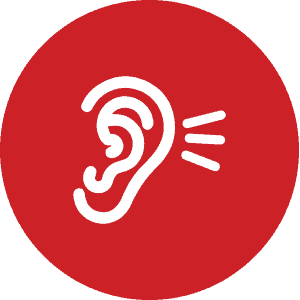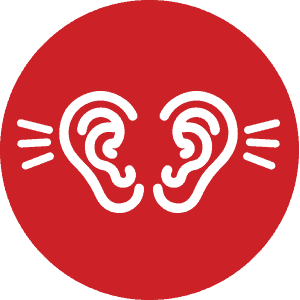Hearing Loss and Cognitive Fitness
Congratulations on your first step to better hearing and cognitive health. Following your hearing health consultation, this booklet may remind you of all you have learned today and help you keep track of your hearing and cognitive health. A product of our collective knowledge and experience in providing hearing care from diagnosis to treatment plans for hearing impairment, this booklet will be a useful tool for you to better understand your condition. In case you are getting one for your loved one who is suffering from hearing loss, this booklet can provide you with helpful insights into their condition and how you can help them in your own way. Should you or someone you know experience hearing loss in Singapore of any kind or is diagnosed with hearing impairment, consult our centre today and let us help you live a normal life with the proper hearing care for the condition.
IT’S NOT “JUST” ABOUT HEARING BETTER
Overwhelming clinical evidence shows the importance of hearing in the context of maintaining cognitive health. Even a mild hearing loss of as little as 25dB already impacts cognitive functions. Thus, diagnosing and addressing hearing impairments in the earliest stages is very critical.
COGNITIVE HEALTH IS IN YOUR HANDS (EARS)
Hearing and cognitive functions depend on input from your senses to develop and maintain. As we age, our sensory organs deteriorate and lesser input is provided, resulting in a chain reaction of cognitive and social deprivations. Hearing loss in Singapore is one of the most common effects of ageing. If not stopped and reversed, it may lead to progressively more hearing and cognitive problems. Hearing impairment, just like the loss of hearing ability due to old age, can significantly affect a person’s mindset and social skills.
Recovering from hearing impairments is one of the things (besides exercise and learning new skills) which is easily done with the help of an objectively chosen hearing aid technology, auditory field expansion and auditory training for hearing loss. All of which will make you hear more, better and easier and by extension provide the much-needed input into your cognitive system to not only help to avoid cognitive decline but also can reverse it.


AUDITORY PERCEPTION AND IMPACT REPORT
Standard hearing screenings and even comprehensive audiological assessments do not necessarily reveal the full picture of your hearing status. The auditory perception and impact report clearly shows how many sounds your cognitive system is deprived off. It also shows the impact this potentially has on your risk of falling and your increased risk in developing dementia.
It also shows your target hearing field expansion for soft and loud sounds. Together we will work to very gradually make you hear more again to reach these targets.
KEEPING TRACK OF YOUR HEARING AND COGNITIVE HEALTH
As a simple visual summary, this guide shall help you track your hearing and cognitive developments and to seek treatment timely, before deprivation effects impacted the quality of your life. Once your test results are not in the green fields, it’s time to take action.
HOW WE HEAR AND LISTEN
The process of hearing and listening is very complex and is to a large extend a cognitive process that develops and depends based on the amount and quality input from the ears. Hearing loss affect not only our auditory function but our cognitive functions as well.
HEARING TRAINING
More and better auditory input will automatically train and rehabilitate your hearing impairment. For faster and better results and depending on your individual needs, The Hearing Solution Group will give you some hearing exercises or enrol you in a structured hearing training program.
HEARING AID STYLE AND TECHNOLOGY OPTIONS
While hearing technology prescription is objectively determined by your test results, hearing aid styles, size and high tech user convenience features are options you might choose based on your preference and lifestyle.
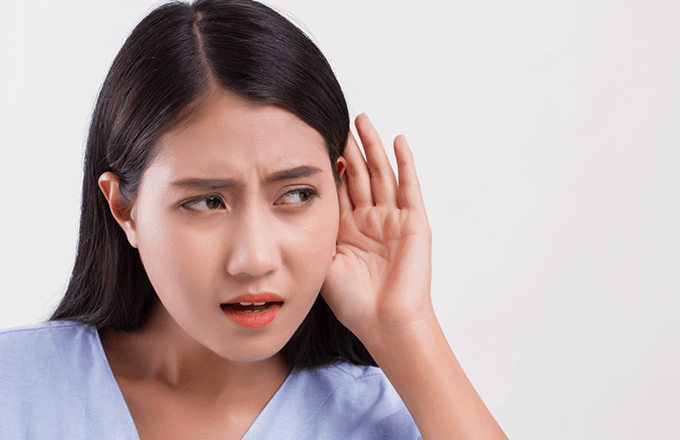
Why You Need To Hear With Both Ears
SAFETY
When a person hears with only one ear, locating sound in traffic is a problem.
IMPROVED UNDERSTANDING OF SPEECH
Binaural hearing helps us to sort out and understand individual voices. Prosody, Melody and Temporal language cues depend on binaural hearing.
BOTH EARS STAY ACTIVE
When a bilaterally hearing impaired person wears a hearing aid in only one ear, the unaided ear tends to lose its ability to hear and understand speech faster. This may become permanent if not corrected in time.
CUSHIONS LOUD SOUNDS
Sudden loud sounds lose much of their jarring effect when perceived with both ears.
BETTER FREQUENCY IDENTIFICATION
Many noises which sound almost alike when heard with one ear can be identified more easily when hearing with both ears.
SMOOTHER TONE QUALITY
Binaural hearing requires less volume, giving a more natural, comfortable sound to voices and music.
HEARING FROM BOTH SIDES
As nature intended, hearing with both ears allows you to enjoy a more normal social life.
Impact of Untreated Hearing Loss – Cognitive Decline
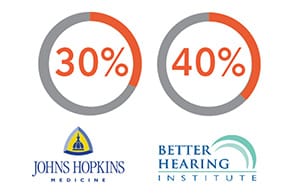
COGNITIVE DECLINE
Adults with untreated hearing loss experience a 30-40% decline in cognitive abilities.
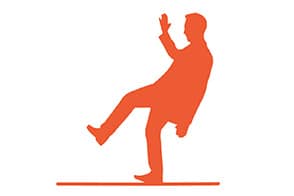
BALANCE
People with mild hearing loss are 3x more likely to have a history of falling. Every additional 10 decibels of hearing loss increases the chances of falling by 1.4x.
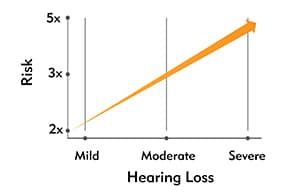
DEMENTIA
Adults with untreated hearing loss are more likely to develop dementia.

DEPRESSION
Those with untreated hearing loss have significantly higher incidence of feeling of isolation and depression.

LIFESPAN
Studies show, older adults with untreated hearing impairment have a shorter lifespan than peers with a hearing problem that wear hearing aids.

TINNITUS
90% of people with tinnitus have hearing loss.
Talking with a loved one
Hearing loss doesn’t just affect the person who has it. It also affects spouses, family members and friends. From frustration with having to repeat things over and over to heartbreak at seeing someone you care about isolate themselves from the people and activities they love. The negative effects of hearing loss cast a wide net.
Convincing a loved one to seek help is the right thing to do, but it’s not always easy. Below are some dos and don’ts to help you approach this important subject.


Slow and steady wins the race
Left untreated, hearing loss can affect a person’s quality of life in many ways. Yet without even realizing it, you may be making it easier for someone not to seek help. Well-intentioned efforts such as repeating yourself or “translating” what others are saying
WHAT YOU CAN DO?
- Talk to your loved one about their hearing concerns.
- Gently remind them of their loss every time you “translate” or repeat something for them.
- Recommend they visit a hearing professional or websites like sg.hearingsolution.com.sg to do more research and get their questions answered.
- Offer to schedule and attend a hearing consultation with them.
- Remind them they have nothing to lose and potentially everything to gain by seeing a hearing professional.
Don’t be surprised if you get resistance
Unlike eyesight, when hearing changes, people are in less of a hurry to do something about it — with many waiting five to seven years before finally seeking treatment. Be prepared for pushback with these responses.
Q: My family doctor would have told me if I have hearing loss
A: Not true — less than 20 percent of physicians routinely screen for hearing loss during physicals.
Q: Wearing a hearing aid will make my hearing loss obvious.
A: Today’s hearing aids are sleek and stylish or even invisible and certainly less noticeable than if you constantly ask people to repeat themselves, inappropriately respond, or don’t respond at all.
Q: A little hearing loss is no big deal.
A: The fact is, studies have linked untreated hearing loss to stress, depression, social rejection, increased risk to personal safety, reduced earning power loss of cognitive abilities, dementia and more.
There are various causes of hearing impairments among children and adults. Thus, one should not conclude that hearing loss is always associated with certain phenomena such as old age or complications. Here are some of them:
Hearing loss due to old age
Age-related hearing loss, or presbycusis, is the most typical form of hearing loss. This refers to the over time occurring progressive loss of hearing. Hearing loss is a normal part of ageing and it can be treated, just like other physical changes brought on by ageing. Before your symptoms get worse or until someone else detects you're having problems, you might not even be aware of its development. Finding some sounds annoying or excessively loud is one of the key symptoms. Additionally, you can experience ringing in the ears.
Presbycusis is a form of sensorineural hearing loss, which means that as people age, their inner ears change and this results in presbycusis. Alterations in the middle ear or in the neural impulses going to the brain can also cause it.
Genetics-related hearing impairments
It is possible for conductive, sensorineural, or mixed hereditary hearing loss to be caused by a genetic condition that is inherited from a parent. There are various hereditary and uncommon disorders known to include hearing loss.
Exposure to Very Loud Noises
Long-term exposure to loud noise results in hearing loss due to noise. Although most cases of noise-induced hearing loss are temporary, prolonged exposure to high noise makes it more difficult for the ears to rehabilitate between occurrences. Hearing loss that is brought on by noise deteriorates over time and becomes irreversible.
Hearing loss could have so many different reasons. To help address your hearing impairments, hearing healthcare specialists are trained to use a variety of diagnostic procedures. The best route of treatment can be found once the reason has been identified.
There are steps you can take to reduce your chance of getting hearing loss from natural causes. Here are some strategies for avoiding hearing impairments:
Maintain a healthy lifestyle
Exercise enhances blood flow and benefits your body in a variety of ways, including ear health. Take some measures to keep your stress levels in check because sustained high levels of stress are bad for your hearing.
Tracking Your Family’s Medical History
Although being aware of your family's medical history won't help you avoid hearing loss, it will let you know whether your risk is higher than average. Early detection can lower your risk of developing hearing loss' adverse effects.
Avoid Loud Noises
It is always a good idea to safeguard your hearing when you are going to be exposed to loud noises, regardless of your age or your hearing condition. Simply said, loud noises are the worst thing you can do to your hearing, therefore it's best to stay away from them.
Frequently Asked Question
Sensorineural hearing loss, conductive hearing loss, and mixed hearing loss are the three categories of hearing impairment. The most prevalent type of hearing impairment is sensorineural hearing loss. When the inner ear neurons and hair cells are destroyed, this condition develops. Meanwhile, conductive hearing loss is usually caused by earwax or tumour obstructing the outer or middle ear. The term "mixed hearing loss" refers to a combination of the two types of hearing loss.
People with any degree of hearing impairment, from slight to profound, are generally referred to as "hearing impaired" or patients with hearing impairment including those who are deaf or those who are having a hard time hearing things. These individuals may have lost or weakened their sense of hearing due to illness or accidents.
There are many causes of hearing impairment, some are natural while some are due to illnesses or accidents. One may suffer from hearing impairment due to old age, colds (temporary), ear wax blockage, damages on the inner parts of the ear and nerve problems. It is recommended to consult a doctor at the first observation of hearing loss for better assessment.
There are several risk factors that may affect the development of hearing impairment for most people. Ageing, genetics, prolonged exposure to damaging noise at work, loud noises from recreational activities and certain illnesses as well as medications are just some of the common risk factors to having hearing impairment. See a doctor at once when you experience hearing loss relating to these factors.

 Find Us
Find Us Call Us
Call Us

